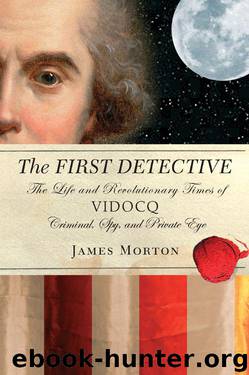The First Detective: The Life and Revolutionary Times of Vidocq: Criminal, Spy and Private Eye by James Morton

Author:James Morton [Morton, James]
Language: eng
Format: epub
Tags: BIO017000, BIO015000, BIO024000, BIO027000
ISBN: 9781590208908
Publisher: The Overlook Press
Published: 2011-06-30T04:00:00+00:00
Chapter 15
VIDOCQ
RESTORED
In which our hero possibly acts as a police spy – possibly finds some
medals – certainly arrests some burglars – with the help of an arms
dealer gets his old job back at an increased salary – helps to break up an
insurrection and, for his pains, is criticized – hides one of his men from
view and ultimately suffers for it
DISCONTENT WITH THE Government of Charles X came to a head in 1829 when the King dissolved the Chamber of Deputies for protesting against his anti-liberal pro-Catholic reactionary policy. Born in 1757 the younger brother of both Louis XVI and Louis XVIII, an émigré in 1789, he spent several years in England before returning at the Restoration to lead the Ultras, the extreme Royalist party. He succeeded to the throne in 1824 on the death of Louis XVIII. His coronation at Reims on May 29, 1825, was an occasion of great pomp with considerable religious emphasis, something which disturbed many.
With the July Revolution of 1830 the elder branch of the Bourbons which had been restored in 1814 was overthrown and Louis-Philippe, duc d’Orléans, now became King.1 The revolution of July 28, 1830, lasted a bare three days. The previous year, when the King had dissolved the Chamber of Deputies for protesting against his policies, the reply was swift. A new chamber was returned with a much larger opposition party. On July 26, 1830, the King then issued ordinances which once more dissolved the chamber and changed the electoral law. In doing so he violated the Charter of 1814.2 His act was seen as a small-scale coup d’état and was roundly condemned. Street fighting broke out on July 27 and lasted for the three days known as les trois glorieuses, before Charles abdicated in favor of his grandson, the ten-year-old duc de Bordeaux, son of the duc de Berri. Some thought that if the ever-popular duchesse de Berri had actually appeared with her son and said, “This is your King” the crowd would have risen to acclaim him.3 She did not, however, and the Orléanist faction then successfully engineered the establishment of a constitutional monarchy. On August 7 Louis-Philippe was proclaimed King. The same day a new charter replaced the one of 1814.
There is no record of Vidocq taking an active part in the Revolution. He had, however, been caught up in an earlier street disturbance when, on May 10, 1830, he was near the Commissariat of Police when an ex-convict and ex-police spy, Renaud, recognized him and began to incite the crowd against him. Taken in to the Commissariat he changed clothes with a man, Valcour, who then left in a cab. Vidocq, now unrecognized, slipped away in the crowd.
Always one with an eye for the main chance, he remained at Saint-Mandé during the three days of the Revolution where, at seven on the morning of July 28, he hoisted the tricolore. He declined to lower it on the instructions of both the gendarmerie and the Commandant of the troop at Vincennes.
Download
This site does not store any files on its server. We only index and link to content provided by other sites. Please contact the content providers to delete copyright contents if any and email us, we'll remove relevant links or contents immediately.
Hit Refresh by Satya Nadella(9126)
When Breath Becomes Air by Paul Kalanithi(8427)
The Girl Without a Voice by Casey Watson(7885)
A Court of Wings and Ruin by Sarah J. Maas(7822)
Do No Harm Stories of Life, Death and Brain Surgery by Henry Marsh(6938)
Shoe Dog by Phil Knight(5257)
The Rules Do Not Apply by Ariel Levy(4957)
A Higher Loyalty: Truth, Lies, and Leadership by James Comey(4954)
Hunger by Roxane Gay(4922)
Tuesdays with Morrie by Mitch Albom(4770)
Everything Happens for a Reason by Kate Bowler(4734)
The Immortal Life of Henrietta Lacks by Rebecca Skloot(4580)
Millionaire: The Philanderer, Gambler, and Duelist Who Invented Modern Finance by Janet Gleeson(4469)
How to Change Your Mind by Michael Pollan(4355)
All Creatures Great and Small by James Herriot(4311)
The Money Culture by Michael Lewis(4198)
Man and His Symbols by Carl Gustav Jung(4131)
Elon Musk by Ashlee Vance(4121)
Tokyo Vice: An American Reporter on the Police Beat in Japan by Jake Adelstein(3983)
